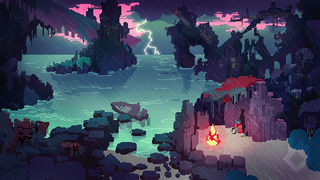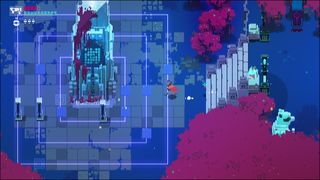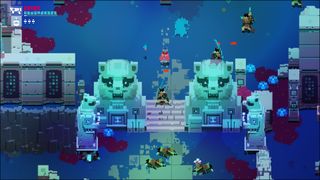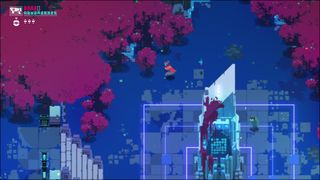
Given that hardly a week goes by without some new crowdfunding car crash to wring our hands over, it’s a relief to meet a team which seems to have its shit entirely together. At this year’s GDC I met with Alex Preston, Beau Blyth and Teddy Diefenbach to find out how Heart Machine’s hotly-tipped and heavily-backed Hyper Light Drifter is coming along. When I saw the game at the same event a year ago, only the co-op horde mode was playable. The story stuff, in which the eponymous Drifter searches the land of Buried Time for the cure to a mysterious disease, remained under wraps.
It was clear even then, though, that the crunchy combat and ultra-stylish animation made Hyper Light Drifter stand out, and feel like more than just another pixel art nostalgia trip. Yes, the game nods vigorously at classic 16-bit JRPGs, but it’s fresh and modern too. It’s also pretty hard. This time we did sample the single-player mode, as PC Gamer editor Samuel Roberts and I took it in turns to explore the top-down vividly coloured landscape whilst gunning down and chopping up the local fauna, passing the controller each time one of us died. Which was often.
The exact illness that ails the Drifter isn’t clear, but it must be bad given the number of aliens he’s willing to kill for the cure. “There’s not a lot of heroism in this story,” notes Preston. “It’s a very selfish story ultimately.” Or maybe the Drifter just likes watching their death animations, which are all gasping mouths, spurting blood, and clawing claws. Wonderfully evocative, given the deliberately limited palette. The weapons we get to try also have a consistently pleasing heft and plenty of variety. I particularly liked the reflective rail gun, which enables you to line up Paul Newman-style trick shots, whilst my colleague prefered landing massive splattery crits using the short-range blunderbuss.

Smartly, for the sake of both balance and encounter diversity, you can’t just sit back and blast creatures into their constituent pixels. Ammo is stingily limited, and to replenish it you need to use your dash to get close and perform sword kills. Dash also functions as your Ninja Gaiden-style dodge, and you’d better get good with it if you don’t want to get known as the Hyper Dead Drifter. Samuel observed that the core of the combat is essentially “running away”, but I think, once mastered, you’ll be flitting around the battlefield chopping heads and popping shots between judicious dashes.
Balancing difficulty on a game like this, without an enormous QA department, requires innovative approaches. Particularly as the people making the game are, inevitably, the best players at it, and therefore not necessarily best placed to judge what’s easy versus what’s annoying. Last September saw a three-day preview build go out to Hyper Light Drifter’s backers, and more recently the team used students on a university game design course as their guinea pigs. One of the key pieces of feedback, which is heavily analytics driven, was that typical players were taking a lot longer to explore than the Heart Machine team had expected. This emboldened them to actually cut some content, on the basis they’d rather go for an all-killer, no-filler approach. “I would rather have a polished experience than a long experience,” says Preston, “and I think most people would.”
This has meant losing some material that was either deemed extraneous or not as effective as the best bits. Preston describes the process as distilling Hyper Light Drifter down to “a more refined, pure crystal meth version, rather than having it blown out everywhere.”
I note that that no-one wants to play the bad meth. “No!” says Preston. “Nobody wants the coke cut with baking soda. We want the pure Colombian.” Diefenbach laughs and queries: “Pure Colombian meth?” “No, coke!” replies Preston. “I switched drug metaphors.”
The biggest gaming news, reviews and hardware deals
Keep up to date with the most important stories and the best deals, as picked by the PC Gamer team.

What I don’t expect will get cut are the boss encounters. We saw two, and both seemed fun and, putting it politely, quite challenging. In the first, Samuel was repeatedly crushed and frozen by a giant green crystalline queen. In the second, with Preston manning the controller, a giant cybertoad thing vomited up scuttling enemies. The sound effect isn’t in yet though, so Preston provided an a cappella BLAAAAAARG each time the animation happened. Such is life on one of the highest profile indie games currently in development.
Once we’re done playing, I ask the three of them if, given the increasing scrutiny on crowdfunded games, they feel any additional pressure to deliver a game that satisfies the backers’ expectations. “I don’t feel pressure,” says Blyth, whose credits include Samurai Gunn, and who genuinely seems completely relaxed. “Our community is very positive and Alex puts a lot of work into checking it and keeping up with people. Whenever we've had to push stuff [back], people have been like ‘yeah, we good. You’re just trying to make it better.’”
“I wouldn't say pressure,” adds Diefenbach. “I think responsibility for sure. If I didn't feel like we had a handle on it, that would be a big problem because keeping the Kickstarter ecosystem alive is important. Maybe not necessarily to our game, because we have our funding already, but to our colleagues and other people. And, you know, if we ever wanted to kickstart something else, keeping accountability as part of that community is super important. If the floor falls out then that hurts a lot of indie development.”
“I think people found that Kickstarter is not just a pre-order system,” says Preston.
“I think people still think it’s a pre-order system,” says Blyth, laughing.
Communication with the backers is obviously key. It’s when developers go quiet that the horses get startled. “I think people are starting to become a little more wary of no-names,” says Preston, “or people that they can’t necessarily trust, because there’s been failures and scams here and there. Not just in games. With crowd-funding you have to be able to trust the people you put your money towards.”

Diefenbach believes that many of the current problems with crowdfunding stem from misperception. “There this conflict between what Kickstarter eponymously is supposed to be—which is a way to get a project started—and what it has become, in terms of audience expectation and how it actually works, which is [the idea] that you’re funding the whole project. So that’s why people are confused as to whether it’s a pre-order or just supporting—and there are risks, because in the regular games industry, with a publisher or anyone else who’s funding, you don’t fund the whole game upfront. You establish a whole game budget, but then you fund a little bit and then you do milestones.”
The release date for Hyper Light Drifter has always been kept deliberately loose. ‘Early 2015’ has become just ‘2015’, but from what we saw the game appears to be in rude health. The team sound confident that it will be out at some point in the second half of the year. “Yeah, we’re working hard to do 2015,” says Preston. “We have our schedule set and we’re just working our goddamn asses off making it.”
The focus now is on polish and fine-tuning to ensure the atmosphere and story come across as intended. Not that they’re making it easy on themselves. The game will feature no words whatsoever, even in the menus. There will be a few cut-scenes to introduce more complex concepts, but again, all entirely wordless. Diefenbach grins when I ask him whether they just hate writers as he’s walking us out. I don’t think that’s really the case though. I think the Heart Machine team knows that retaining a sense of mystery is a big part of what makes Hyper Light Drifter feel special. When it comes to being badass in outer space, maybe less really is more.
With over two decades covering videogames, Tim has been there from the beginning. In his case, that meant playing Elite in 'co-op' on a BBC Micro (one player uses the movement keys, the other shoots) until his parents finally caved and bought an Amstrad CPC 6128. These days, when not steering the good ship PC Gamer, Tim spends his time complaining that all Priest mains in Hearthstone are degenerates and raiding in Destiny 2. He's almost certainly doing one of these right now.
Most Popular

